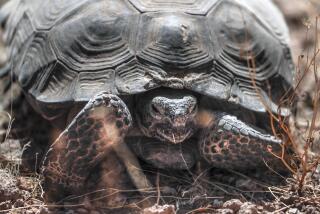FOUNTAIN VALLEY : Patron Saint of Turtles Shells Out
- Share via
Known as the patron saint of turtles and tortoises, Walter Allen is doing everything he can to make sure these reptiles don’t become extinct.
To preserve and educate others about these animals, Allen has built a refuge called Casa de Tortuga for his private collection, which contains 100 different species and about 600 individual animals. He also runs a turtle and tortoise adoption service.
At Casa de Tortuga, a nursery is filled with incubators of eggs and a room is lined with glass aquariums for hatchlings and exotic species. Outdoors, 275 water turtles live in a 5,000-gallon heated pond, and box turtles, endangered Galapagos Island tortoises, Burmese brown tortoises and others roam in pens.
Allen’s interest in these reptiles started as hobby.
“They’re something I fell in love with 25 years ago,” Allen said, pointing out for the uninitiated that tortoises are land animals and can’t swim, while turtles live, eat and mate in the water, and also have webbed feet.
Allen, who is retired, has had a variety of experiences with these reptiles, having cared for everything from hatchlings to 350-pound Aldabra Island tortoises. He has nursed back to health turtles whose shells were chewed by dogs and others who were hit by lawn mowers.
Casa De Tortuga is authorized by the state to participate in a permit program for people who want to adopt an endangered California desert tortoise, said John A. McNett, Allen’s assistant. Otherwise, it’s illegal to take these tortoises from their natural habitat.
These desert tortoises face extinction from habitat destruction or from people who capture and kill them for food.
Other endangered species at Casa de Tortuga include the Florida, Texas and Mexican tortoises.
Also available through Casa de Tortuga’s adoption program are pond turtles, such as the red-eared slider and box turtles. New owners are given information and assistance so they can properly care for and feed their pets.
People interested in adopting must complete a form and interview and wait a day before taking an animal home. “We don’t want the animal back in three weeks with malnutrition or mistreatment,” he said.
The most popular species for pets in Southern California are the desert tortoise and box turtle--a non-native specie whose shell closes up just like a box. The box turtle is semi-aquatic, needs water constantly, is easiest for people to maintain and likes to live outdoors--not in an aquarium, Allen said.
More to Read
Sign up for Essential California
The most important California stories and recommendations in your inbox every morning.
You may occasionally receive promotional content from the Los Angeles Times.












